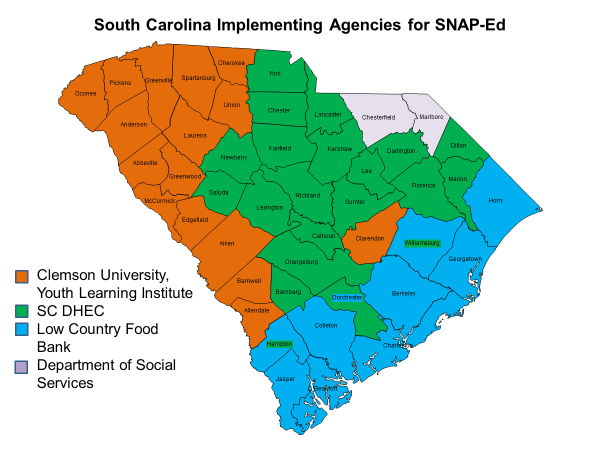The goal of the SNAP-Ed Program is to improve the likelihood that persons eligible for SNAP will make nutritious food choices within a limited budget and choose physically active lifestyles consistent with the current Dietary Guidelines for Americans and the USDA food guidance. The SNAP-Ed Program is funded by the United States Department of Agriculture (USDA) through a partnership with the SC Department of Social Services.
The focus of SNAP-Ed is to: 1) implement programs and promote health promotion activities to help the SNAP-Ed households establish healthy eating habits and a physically active lifestyle, and 2) help SNAP-Ed households at risk for nutrition-related chronic diseases, prevent or postpone the onset of disease by making healthier food choices and increasing physical activity.
SNAP-Ed programs focus on changing behaviors and all nutrition education and obesity prevention initiatives are evidenced-based.
Through a partnership with DSS, DHEC SNAP Education initiatives provide direct nutrition education to SNAP eligible participants in twenty-one counties. The staff provide nutrition education to children and adults throughout the life cycle.
DHEC SNAP-Ed Service Areas:
Counties: Bamberg, Calhoun, Chester, Darlington, Dillon, Dorchester, Fairfield, Florence, Hampton, Kershaw, Lancaster, Lee, Lexington, Marion, Newberry, Orangeburg, Richland, Saluda, Sumter, Williamsburg and York counties.
Sites: Head Start programs, elementary schools, children’s museums, food pantries, recreational centers, community centers, churches, housing authority sites, drug and alcohol addiction centers, libraries, summer camps, county libraries, senior citizen centers and federally qualified health centers.
Contact Clemson University Youth Institute and Lowcountry Food Bank and find out more information.
In accordance with federal civil rights law and U.S. Department of Agriculture (USDA) civil rights regulations and policies, this institution is prohibited from discriminating on the basis of race, color, national origin, sex (including gender identity and sexual orientation), disability, age, or reprisal or retaliation for prior civil rights activity.
Program information may be made available in languages other than English. Persons with disabilities who require alternative means of communication to obtain program information (e.g., Braille, large print, audiotape, American Sign Language), should contact the responsible state or local agency that administers the program or USDA’s TARGET Center at (202) 720-2600 (voice and TTY) or contact USDA through the Federal Relay Service at (800) 877-8339.
To file a program discrimination complaint, a Complainant should complete a Form AD-3027, USDA Program Discrimination Complaint Form which can be obtained online at: https://www.usda.gov/sites/default/files/documents/USDA-OASCR%20P-Complaint-Form-0508-0002-508-11-28-17Fax2Mail.pdf, from any USDA office, by fax (866) 632-9992, or by writing a letter addressed to USDA. The letter must contain the complainant’s name, address, telephone number, and a written description of the alleged discriminatory action in sufficient detail to inform the Assistant Secretary for Civil Rights (ASCR) about the nature and date of an alleged civil rights violation. The completed AD-3027 form or letter must be submitted to USDA by:
- mail:
U.S. Department of Agriculture,
Office of the Assistant Secretary for Civil Rights
1400 Independence Avenue, SW
Washington, D.C. 20250-9410
- fax: (866) 632-9992 or by phone (202) 690-7442; or
- email: program.intake@usda.gov
This institution is an equal opportunity provider.

